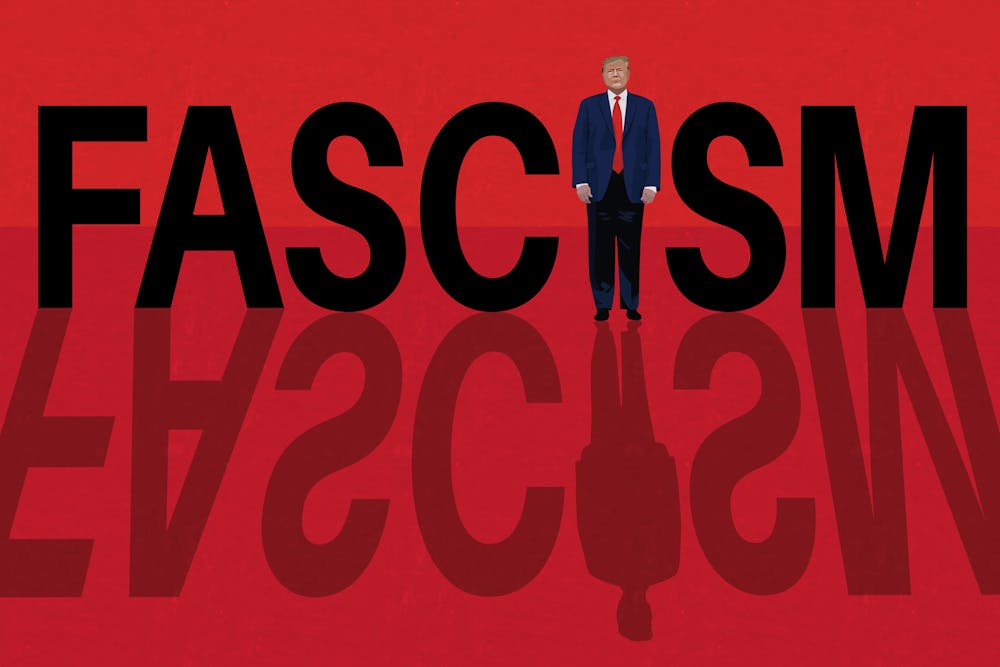Last Tuesday, millions of Americans watched in disbelief as counties and states across the nation bloomed bright, overwhelming red with Donald Trump winning both the popular vote and the Electoral College. A race so imbalanced that no amount of misplaced blame on third-party voters can account for the 3 million vote difference between Kamala Harris and Trump. The next morning, there was a curtain of disbelief throughout liberal circles — how could anyone vote for that man? Let alone the majority?
These expressions of confusion flooded social media, but the nation’s surge toward conservatism and, more specifically, Trumpism, should not be surprising. If anything, these reactions to an all-red federal government say less about Trump’s appeal and more about naivety toward rising fascist sentiments. His securing both the Electoral College and the popular vote aligns well with the growing attachment to fascist ideals, something Trump has openly embraced throughout his campaigns.
Unlike Harris’ appeal to a political middle ground and insistence on reasonable disagreement, Trump ran on a hard-right conservative platform that actively belittled any left-leaning ideology. From border policy to economics to education, the ultraconservatism espoused by Trump is eerily similar to the fascist practices of historically authoritarian governments — including our own.
To only credit his personal branding or the bigotry of his supporters for his popularity dismisses the insidious nature of fascism. In reality, it is both of these things as well as a desire for improved material well-being and stability that grant fascism a competitive edge in times of turmoil. Trump answers these calls by creating sacrificial lambs to shoulder the blame for a failing economy or social unrest, whether it be undocumented immigrants or transgender people. Dehumanization is just one, especially salient, means of satisfying millions of unhappy, uninformed people that fascism has long held dear and Trump has wielded.
His demands to “Make America Great Again” ring especially well during extremely socially-stratified times. There are constant worries about the effects of political polarization, but the far greater danger of social polarization is the real force behind the alt-right conservative pipeline. Historically, racism has been the social ideology most associated with right-wing organizing, for example.
Today, transphobia has become an effective tool for the advancement of fascist policies, with millions of Americans encouraging the political scapegoating of trans people on the persuasive basis of hate and vitriol. Intimately aware of this, Trump harnessed this distrust and discrimination to add emotional and normative fuel to his campaign. It’s a move that is uncomfortably similar to the persecution of male homosexuality under other more heinous fascist regimes, like Nazi Germany in the 1930s.
Trump’s fascist ways are not discreet or disguised to his followers, rather, there is an immense cognitive dissonance taking place that leaves many unable to identify fascism. As he champions exclusionary politics and an “us vs. them” mentality, he builds a narrative of perpetual victimhood and targeting by the “woke” elite that places him and all of his supporters as radical outsiders. They cannot be oppressors, let alone fascists, because they are misunderstood underdogs concerned only with the welfare of their nation, a noble cause for noble people.
Trump supporters worship a cult of counterculture delusion, blind to their own fascist tendencies, but they are not alone. In the aftermath of the election, it has become clear that many liberals are oblivious to this as well, not only in the shock many express at the results but even in their own relationship to authoritarianism.
How can you explain such a great loss for Harris? Many look to ignorance or bigotry, but the answer is far more complex than that: fascism has been rejuvenated in recent years, and less unacceptable than in the recent past. It also means recognizing that Trump supporters are, to some extent, fascists and that this label is not as far removed from any voter as we would like to believe it is.




